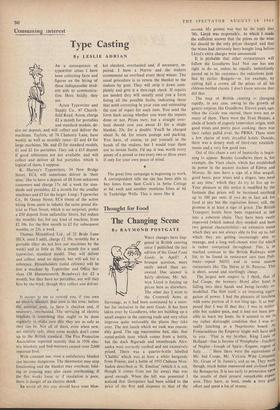Thought for Food
The Changing Scene
By RAYMOND POSTGATE
WHAT changes have hap- pened in British catering since I publiihed the last edition of the Good Food Guide in April? A brusque question, more easily asked than an- swered. One answer is fairly obvious; Mr. Sel-, wyn Lloyd is forcing up prices here as elsewhere. The other day I, went to the Cromwell Arms at Stevenage, as it had been nominated by a mem- ber for inclusion in the next Guide. It has been taken over by Goodhews, who are building up a small empire in the catering trade and very often improve quite noticeably the places they take over. The test lunch which we took was reason- ably good. The egg mayonnaise had, alas, that metal-polish taste which comes from a bottle, but the duck Bigarade and sweetbreads Alex- andra were correctly cooked and not excessively priced. There was a quarter-battle labelled `Chablis' which was at least a white burgundy from France, and a bottle of 1955 Chateau Mon- badon described as 'St. Emilion' (which it is not, though it comes from not far away) that was good enough. When the bill was presented I noticed that threepence had been added to the price of the first and sixpence to that of the second. My protest was met by the reply that `Mr. Lloyd was responsible, to which I made' the sufficient answer that the prices on the wine list should be the only prices charged, and that the wines had obviously been bought long before Lloyd's extra charges were announced It is probable that other restaurateurs will follow the Goodhews lead Not one has any right to do so, unless he equally immediately passed on to his customers the reductions justi- fied by earlier Budgets—as, for example, by cutting half a crown off the prices of all his chateau-bottl&I clarets. I don't know anyone that did that.
The map of British catering It changing rapidly, in any case, owing to the growth of gastric empires like Goodhews. Eleven years ago, when the Guide was started, there were not so many of them. There were the Tn.'s! Houses, a chain of hotels of vaguely benevolent origin, with good wines and pretty poor cooking; there was their rather pallid rival, the PRHA. There were a few chains of truly dreadful hotels. Outside, there was a dreary mob of third-rate establish- ments and a very few good inns ,Out of this chaos a sort of heptarchy is begin- ning to appear. Besides Goodhews there is, 'for example, the Vaux chain, which has established:, its power in the ancient duchies of Edwin and'' Morcar. Its inns have a sign of a blue seagull, good beers, poor wines and a slogan, 'any meal at any time,' which they do try to live up to. Your pleasure at this notice is modified by the footnote that prices will be increased anything up to 100 per cent. if you do in fact ask for food at any but the regulation hours; still, the promise is at least a sign of grace. The British' Transport hotels have been organised at last into a coherent chain. Th,,y have been vastly improved (which indeed they needed) and have two general characteristics—an extensive menu which they are not always able to live up to, but which they are getting increasingly able to manage, and a long well-chosen wine list which is rather overpriced throughout. This is in marked contrast to the British Railways wine list, to be found in restaurant cars (not Pull- mans—repeat NOT) and in some station restaurants like The Shires at St. Pancras. This is short, sound and startlingly cheap. The largest new empire is, I think, that of Ind Coope, the brewers. Hotel after hotel is falling into their hands and being' lavishly re- modelled. The firm itself is an imposing aggre- gation of power. I had the pleasure of lunching with some portion of it not long ago. It so hap- pened that I was ill that day; I was in notice- able but sudden -pain, and it had not been Pos- sible to warn my hosts. So it seemed to me in , my rather distraught condition that I was ae- tually lunching at a Napoleonic board. At Fontainebleau the Emperor might well have said to you: 'That is my brother, King Louis of Holland—that is Jerome of Westphalia—Joachim of Naples—Joseph of Spain—Eugene, regent of Italy. . . .' Here there were the equivalents of Mr. Ind Coope, Mr. Victoria Wine CompanYi Mr. Grant of St. James's, and so on. They were, though, much better mannered and civilised thell the Bonapartes. It is too early to pronounce uPorl the results of their present remarkable expert' sion. They have, at least, made a very gre3 effort and spent a lot of money.






























 Previous page
Previous page